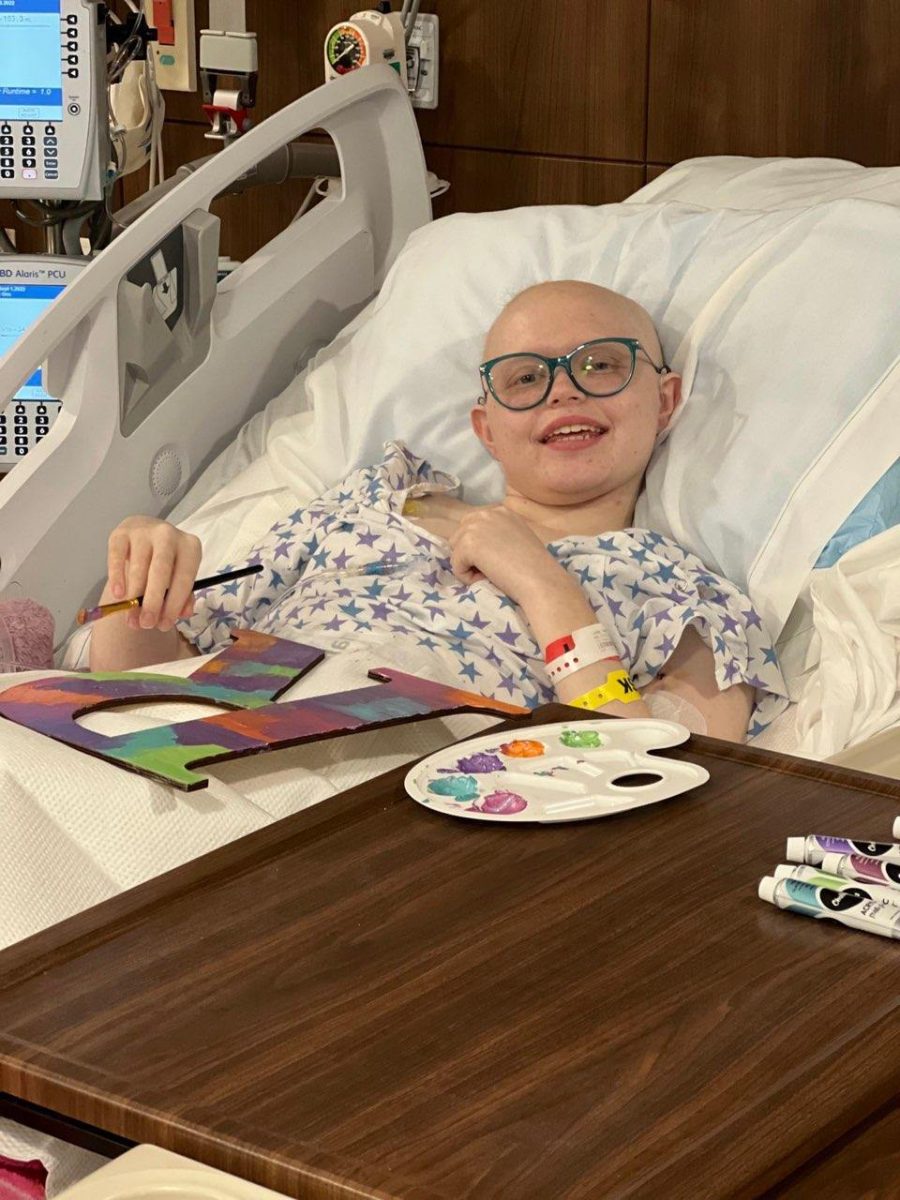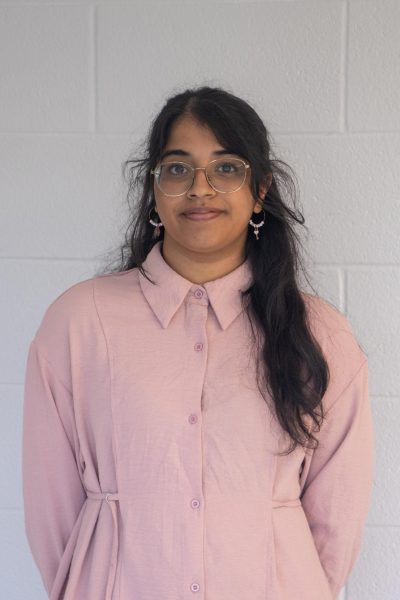Senior Rose Lubbe was diagnosed with a genetic connective tissue disorder called Ehlers-Danlos Syndrome in second grade. For many, it can present as sore joints, nausea, joint hypermobility and chronic bone or muscle pain. Rose, however, has an extremely severe presentation of the syndrome, resulting in a non-functional gastrointestinal system. Rose’s mother, Wendy Lubbe, explained that considering its severity, Rose’s presentation was most likely a mutation of the syndrome.
“The version we think she has, she probably has a mutation of it because her presentation is so severe,” Wendy said. “Connective tissue is everywhere in your body. It would be like if everybody else [had] superglue and you have really diluted Elmer’s glue.”
Furthermore, Rose’s presentation is also incredibly rare. Wendy explained that oftentimes, Rose is referred to as a “unicorn zebra” as an ode to the mascot for Ehlers Danlos and the rarity of her presentation.
“In medicine, they always tell doctors that if you hear [hoofsteps], think of horses, not zebras. They’ll tell doctors who are training, don’t think of the most bizarre, rare thing because almost everybody is a horse,” Wendy said. “People with Ehlers Danlos are the zebras. So the doctors call [Rose] a unicorn zebra because she’s so rare and different.”
Rose had struggled with chronic pains throughout most of her life, but her health took a turn for the worse towards the end of her freshman year when she received an iron infusion–a medical procedure where iron is given through a vein into the bloodstream–and subsequently had a negative reaction to it. This led to what she refers to as “a series of medical mishaps.”
“That kind of started a domino effect of things not going well. It made my stomach stop working and they tried to put in a feeding tube which never really worked right, [so] they ended up [doing] surgery, and I woke up from the intestinal surgery paralyzed,” Rose said.
After her intestinal surgery, Rose’s doctors spent that summer searching for answers to explain her paralysis. It wasn’t until September of 2021 that answers were found, when Rose’s pediatrician spoke to a doctor in Rhode Island and discussed the possibility of Rose having a tethered spinal cord.
“When she was checked out here in Kansas City, they said ‘No, she doesn’t have it.’ It turns out she did, and we think that’s what led to her paralysis.” Wendy said.
A few weeks later, Rose was flown to Rhode Island on a medical airplane. Once in Rhode Island, Rose’s diagnosis of the tethered spinal cord was confirmed by a neurosurgeon.
“So we went to Rhode Island and got spinal surgery to fix that. Then from there, inpatient rehab which was in Nebraska,” Rose said.
Rose was in Nebraska from October through December. Then, in July, Rose was diagnosed with leukemia. Rose’s sister, senior Caroline Lubbe explained that the diagnosis seemed to happen overnight.
“Because of the way her IV nutrition works, we had a nurse come to our house to draw her blood twice a week. On one of those blood tests, her blood counts went from normal to revealing that she had leukemia, like, overnight,” Caroline said.
Since then, Rose has been in the hospital undergoing chemotherapy treatment. At the time of her diagnosis, the bone marrow biopsy had shown Rose’s bone marrow to be 88% leukemia. However, her most recent bone marrow biopsy showed her bone marrow to be 0% leukemia.
In a way, Rose considers the leukemia diagnosis to be easier to accept than Ehlers-Danlos Syndrome.
“Because people know what [leukemia] is, they have very regimented ways that fix it. So many of Rose’s things, people just say ‘Gosh, I don’t know how to help,’” Wendy said.
One of the phrases that Rose has been noted as saying is that “Cancer is annoying.”
“[Rose] said ‘Caroline, cancer is annoying. It is in the way of my life, we will solve it, and everything will be fine.’ She means that it’s a roadblock that she will get around,” Wendy said.
Despite her various diagnoses and numerous medical procedures, Rose has maintained a positive mentality throughout it all.
“I have always been a positive person. I think about the things that keep me happy and try to stay around positive people,” Rose said. Her resilience and positivity have helped keep her family strong as well.
“It’s very hard, as a parent, to watch your child suffer and know you cannot help. But Rose helps all of us because she’s so positive.” Wendy said.
Even though it has been difficult to socialize with people her age, Rose has been surrounded by positive people.
“I’ve met good people and bad people, though most of them have been good. [So many] of them have taken the extra time to help me.” Rose said.
One of Rose’s pillars of support and positivity throughout her journey has been her family, including her parents and her twin sister, Caroline.
“We are opposites, I would say, but we’re very close and Caroline can always make me happy. She is my connection to the outside world,” Rose said. “My parents have helped me advocate and supported me and been there for me.”
Along with Caroline and her parents, Rose has also been surrounded by doctors and nurses who have helped her throughout her journey.
“We are just so incredibly grateful for all of the nurses that we have worked with. They take time out of their day, not only to give her excellent care, but to talk to her, to distract her,” Caroline said.
For Rose and her family, the nurses at every hospital have helped immensely throughout Rose’s health journey.
“This is not a life we thought we would be living, but every day we’re amazed. The nurses just do little things to make her life better, whether it’s bringing up a decoration for her room or talking to her about their favorite episode of Friends,” Wendy said.
Beyond the nurses and doctors, the Lubbe family has found kindness in neighbors, friends, and even complete strangers. For example, when the sidewalks in Rose’s neighborhood made it difficult and a little dangerous for her, due to her being in a power wheelchair, the city sent people to redo all of the sidewalks so that they were accessible to Rose’s wheelchair.
“We have really seen the kindness of friends, family, and perfect strangers. I don’t know where we would be without them.” Wendy said.
Aside from the incredible people, Rose also relies on her rescue dog Macy to keep her going. Many of Rose’s current goals for independence are centered around Macy.
“Basically every goal of independence Rose has right now is just for the dog. We got buttons in our house so she can let the dog out,” Caroline said. “I would say [they] have a special bond.”
Rose also maintains her positive attitude by making her hospital room feel like hers.
“I try to make my hospital room feel like my space,” Rose said. One of the ways she does this is by decorating and hanging up her paintings. In her hospital room, Rose has hung up pictures of a reef that she painted herself.
“[Painting has] always been something that relaxes me, I always like to do stuff that keeps [me] happy,” Rose said.
Though most of her time is spent in physical and occupational therapy, she enjoys doing art when she has the energy. In fact, Rose had a completed outline for which art classes she would have liked to take.
Along with the darkroom photography class, Rose had also planned to take drawing and painting classes. However, instead of art classes, Rose will be taking a total of five classes–including an English, math, and science class–to earn her required credits to graduate next year.
“When Rose was in the hospital, she decided that she had two options. She could either try to graduate on time, and it would be a lot for her to come back to and get her assignments done. Or she could get held back a year. She chose that, and she is now in the junior class,” Caroline said.
In order to properly accommodate Rose’s power wheelchair, Rose and her family have been talking to the district about her graduation plan.
“It’s interesting because, I don’t think in anybody’s recent memory there has been a student at Blue Valley Northwest who wasn’t in room 102, who was a power wheelchair user. I don’t think they’ve had a lot of students like that,” Wendy said. “So we’ve really been trying to work with them on how to make the school accessible.”
Even with the various challenges that have been placed in her path, Rose refrains from asking questions like “Why me?”
“Rose’s always been really positive. She’s never asked ‘why me?’ or she’s never mad at the world,” Caroline said. “One time, I asked her, I said ‘Why? Isn’t this unfair?’ She’s like ‘Well I wouldn’t want anybody else to have it. It’s not why me, it’s just why did this happen?’”
For Rose, this is an obstacle between her now and her future.
“I dream about living a life like everyone [else] and being like every other high schooler. I wish people would look at people with disabilities and see who they are, not just what they can’t do,” Rose said.



